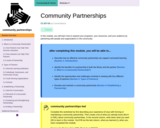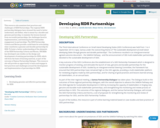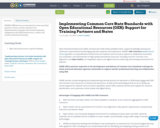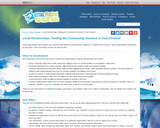
In this module, you will learn how to expand your programs, your resources, and your audience by partnering with people and organizations in the community.
- Subject:
- Education
- Material Type:
- Module
- Provider:
- ConnectedLib
- Date Added:
- 09/09/2022

In this module, you will learn how to expand your programs, your resources, and your audience by partnering with people and organizations in the community.

Learn how Harrison High School in Evansville, IN is using community partnerships to support students in this video from American Graduate Day 2013. Reconnecting Youth is a nonprofit organization that helps bring social workers into schools. High school students often need help balancing school, work and their social lives. Social workers help students improve their time management and communication skills. When students feel more connected to school, they begin to see how they fit in and how they can contribute to their communities. Use the resources in the Support Materials section below to help students improve their communication skills.

This resource site examines best practices and challenges of SIDS Partnerships.
The regional SIDS partnership dialogues have stressed the need to better understand, and define, what is meant by a durable and genuine partnership, to examine the lessons learned from successful partnerships, the challenges faced in implementation, and fostering better stakeholder engagement in partnerships.
The SIDS Partnership Criteria and Norms provide a solid basis for articulating what constitutes a genuine and durable partnership for SIDS.
To foster a better understanding of the elements of the SIDS Partnership Criteria and Norms, UN DESA has developed case studies on the design and development of existing partnerships for SIDS, which will form the basis of learning material, as part of the outcome of Samoa Partnership Dialogue.
This resource site will provide an opportunity to learn and engage in best practices and challenges around the development and implementation of partnerships for SIDS.

ISKME's OER Services are described for states and other partners to focus on their Common Core implementation strategies that include deepening engagement with OER infrastructure, content, and teacher professional learning.

Every great teacher and every great school constantly work towards creating better learning conditions for students. Just as we hope our students become lifelong learners, we as educators should be constantly learning and improving. This education course is for school leaders of all kinds (from teacher-leaders to principals to superintendents) who are launching innovation in schools—starting new efforts to work together to improve teaching and learning.
You will complete a cycle of study, experimentation, and reflection to gain confidence and skills to lead instructional improvement efforts. Through experiential activities and assignments, you will begin working with colleagues to envision the next level of work for your team or organization, to launch a new initiative, and to measure your progress along the way. Based on the work of Prof. Justin Reich and Dr. Peter Senge, this course will focus on visioning and capacity-building, with an emphasis on collaboration and building partnerships with stakeholders at multiple levels.
At the end of the course, you will have started the process of launching an instructional improvement initiative in your school or learning environment, and you will better understand yourself as a leader and change agent. You will have made connections with peers who are also undertaking this important work.
This course is part of the Open Learning Library, which is free to use. You have the option to sign up and enroll in the course if you want to track your progress, or you can view and use all the materials without enrolling.

This article describes how schools can involve local organizations in a festival or informal learning event.

The course draws on faculty members from the Center for Real Estate, the City Design and Development Group (Department of Urban Studies and Planning), and the Media Lab to explore extraordinary projects that challenge conventional approaches to real estate development, urban design, and advanced digital technology.

This course introduces students to the techniques of participatory action research (PAR) and the practice of case study research. PAR processes are place or case-specific, place a premium on local ways of knowing, and gauge the success of research in terms of what partner-communities do with the knowledge that is co-produced. The objective of PAR is to generate the ideas, information, and understandings that ought to inform efforts to promote social change. By focusing on ways of co-producing knowledge using various forms of data collection and analysis, students will learn how the people and communities who are often university partners in applied social science research can use findings or results from PAR case studies to address the challenges they confront in their communities.
Learn more about Participatory Action Research at MIT.